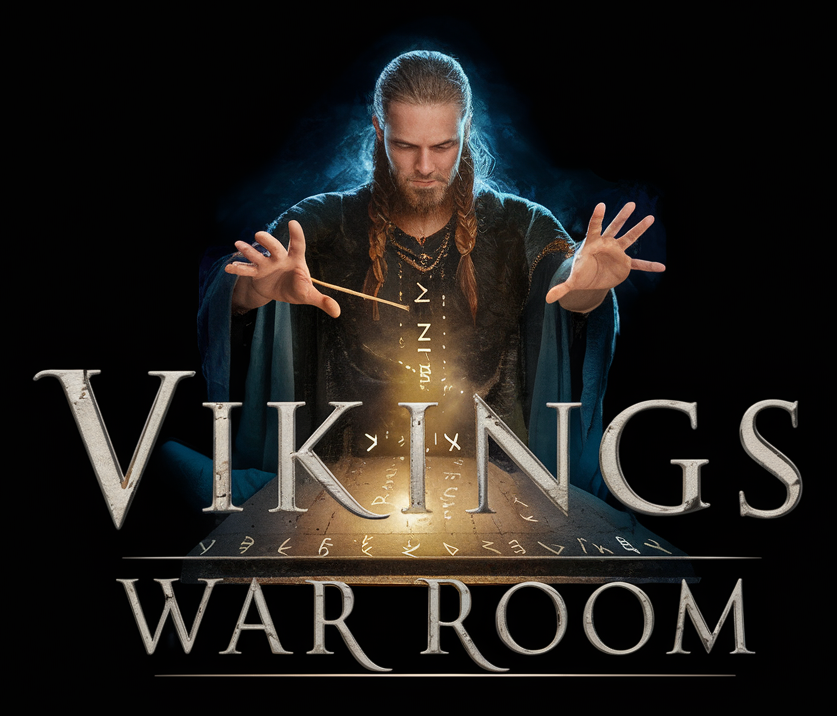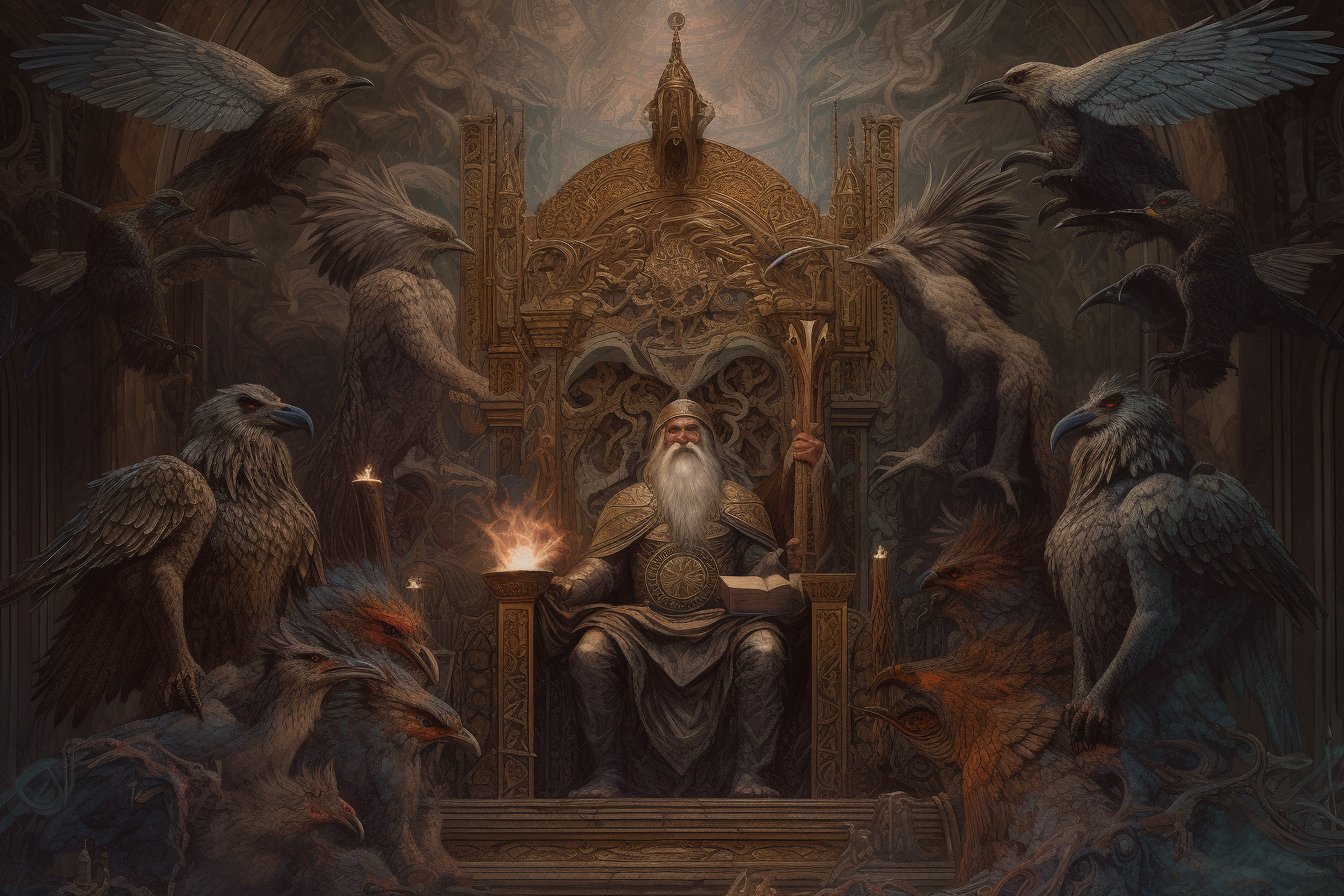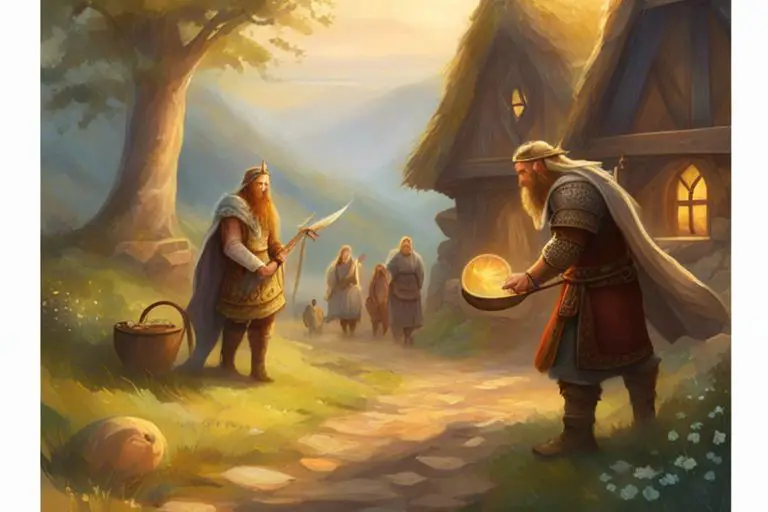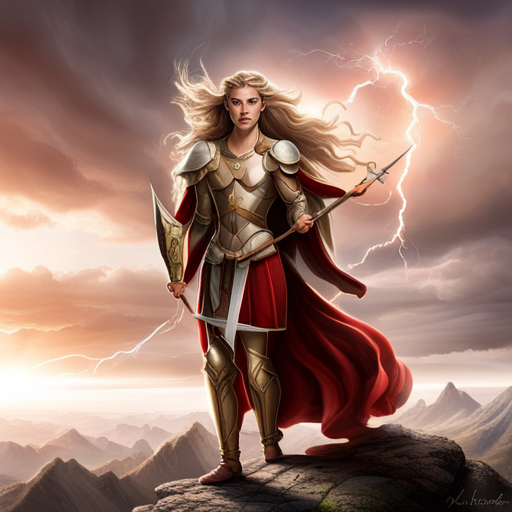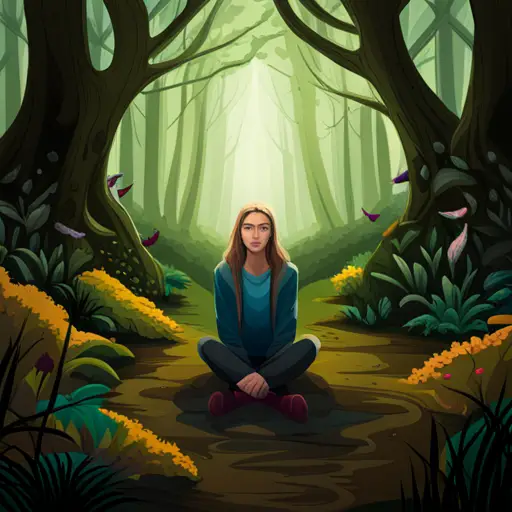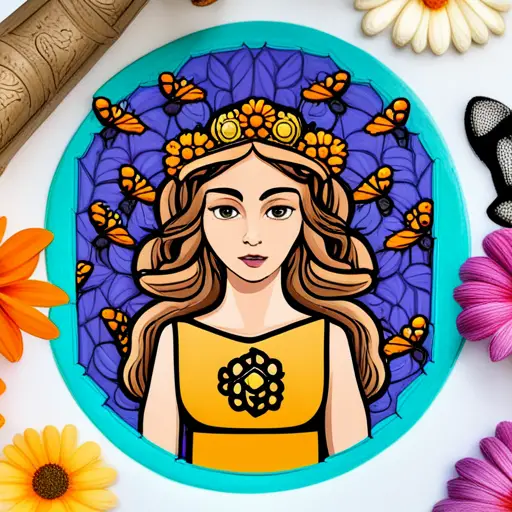There’s an old adage that says ‘you are the company you keep.’ If that’s true, then I am proud to be associated with the Aesir gods of Norse mythology.
These divine beings have captivated my imagination for years, and I believe that exploring their stories and symbolism can help us understand ourselves and our place in the world.
In this article, we’ll delve into the mysteries of the Aesir gods, uncovering their origins, roles, relationships, and symbolism.
Whether you’re a longtime fan of Norse mythology or a newcomer to the world of gods and goddesses, I invite you to join me on this journey of discovery.
Together, we’ll explore the divine pantheon of the Aesir and discover the legacy they have left in modern culture.
The Origins of the Aesir Gods
As we delve into the beginnings of the Aesir deities, we can’t help but feel a sense of awe and wonder at their origins.
The Norse mythology tells us that these gods came into existence after the world was created. Odin, the leader of the Aesir, created the world along with his brothers Vili and Ve. They shaped the earth from the remains of the giant Ymir, and then breathed life into it.
From the trees and the rocks, they created the first humans, giving them the spark of life.
The Aesir gods were not always the only gods in the Norse pantheon. Before them, there were the Vanir gods who were associated with fertility, prosperity, and wisdom.
The Aesir were known for their strength, courage, and prowess in battle. However, after a long-standing war between the two factions, both sides decided to merge into one pantheon and ended the conflict.
This union resulted in the Aesir-Vanir War, which is regarded as one of the most significant events in Norse mythology.
From then on, the Aesir gods became the dominant force in the Norse pantheon, and their stories and legends continue to inspire and intrigue us to this day.
The Roles and Responsibilities of the Aesir Gods
You’ll learn what each Aesir god is responsible for and what their role is in the grand scheme of things.
Odin, the chief of the Aesir gods, is associated with wisdom, battle, and death. He’s also known as the god of poetry, magic, and prophecy.
Thor, the son of Odin, is the god of thunder, storms, and agriculture. He’s also known as the protector of the common people.
Freyja, the goddess of love, fertility, and war, is associated with sexuality, beauty, and death. She’s also known as the goddess of sorcery and magic.
Heimdall, the guardian of the Bifrost Bridge, is associated with sight, hearing, and the sea. He’s also known as the god of light, and his role is to protect Asgard from any danger that may come from the Nine Worlds.
Loki, the trickster god, is associated with chaos, deception, and mischief. He’s also known as the god of fire, and his role is to cause trouble and create chaos among the Aesir gods.
These gods have unique roles and responsibilities that make them essential in the Norse mythology. Knowing their roles and responsibilities will help you understand how the gods interact with one another and the world around them.
As we delve deeper into the world of Norse mythology, we’ll explore the relationships between the Aesir gods and how they interact with one another. Understanding these relationships will help you understand how the gods work together to maintain balance in the Nine Worlds.
Each god has a unique relationship with the other gods, and these relationships shape the mythology and the way the gods function. Stay tuned as we uncover the mysteries of these complex relationships and how they affect the world of Norse mythology.
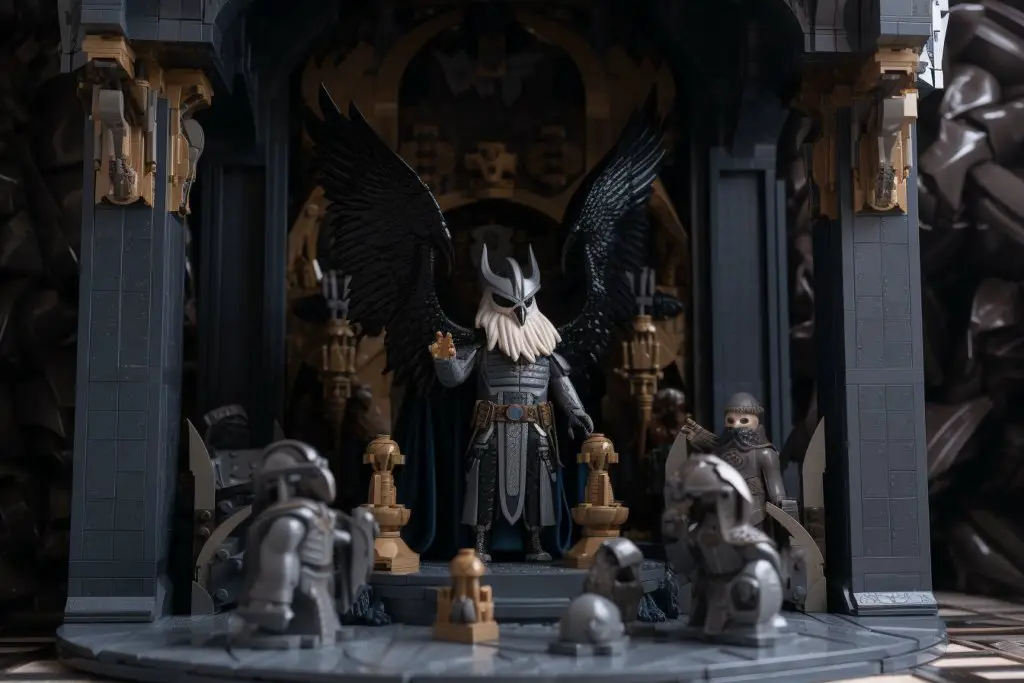
The Relationships Between the Aesir Gods
Let’s take a closer look at how the Aesir gods interact with each other and how their relationships are crucial to maintaining balance in the Nine Worlds.
The Aesir gods are a complex group, with each god having their own specific role and personality. However, they must work together and rely on each other to maintain balance and order in the cosmos.
Odin, the Allfather, is the leader of the Aesir gods. He’s wise and powerful, but he also has a cunning side that’s often used to manipulate events to his advantage.
Thor, the god of thunder, is Odin’s son and a powerful warrior. He’s often called upon to protect the other gods and the Nine Worlds.
Loki, the trickster god, is a complex figure who’s both loved and feared by the other gods. He often causes chaos and mischief, but he also has a talent for solving problems and helping the other gods when they need it.
These three gods, along with the other Aesir, have complex relationships with each other that are crucial to the functioning of the cosmos. Understanding these relationships is essential to understanding the Norse mythological system as a whole.
As we explore the symbolism of the Aesir gods, we’ll see how their relationships and personalities are reflected in the stories that surround them.
The Aesir gods are not just characters in a story, but rather they’re archetypes that represent different aspects of the human experience. These archetypes can help us understand ourselves and our place in the world.
By exploring the symbolism of the Aesir gods, we can gain a deeper understanding of the Norse mythological system and the worldviews of the people who created it.
The Symbolism of the Aesir Gods
Now it’s time to delve deeper into what the Aesir deities represent and how they can provide insight into the human experience.
Each of the Aesir gods has a specific symbolism that reflects the various aspects of human nature. For instance, Odin, the All-Father, symbolizes wisdom, knowledge, and the pursuit of truth. He’s often depicted as a one-eyed god, which represents the sacrifice he made to gain knowledge and wisdom.
Thor, the god of thunder, symbolizes strength, courage, and fertility. His hammer, Mjolnir, is a symbol of power and protection.
Loki, the trickster god, symbolizes chaos, change, and transformation. He challenges the status quo and encourages growth and evolution.
Understanding the symbolism behind the Aesir gods can provide insight into our own lives and experiences. By recognizing the traits and aspects of human nature that each god represents, we can gain a deeper understanding of ourselves and the world around us.
The Aesir gods aren’t just mythological beings from ancient times, but archetypes that continue to resonate with us today.
The Legacy of the Aesir Gods in Modern Culture
Get ready to discover how the Aesir gods have left their mark on modern culture, weaving their way into everything from literature and film to everyday language and idioms.
Here are three ways that the legacy of these gods continues to impact our world today:
- Marvel Comics: With the release of the Marvel Cinematic Universe, the Aesir gods have become household names. Thor, Loki, and Odin are just a few of the characters that have been brought to life on the big screen. These movies have introduced a new generation to the world of Norse mythology, sparking increased interest in the gods and their stories.
- Everyday Language: Many phrases and idioms that we use in our everyday language actually come from Norse mythology. For example, ‘going berserk’ comes from the Norse word ‘berserkr,’ which refers to a warrior who fights with uncontrollable rage. ‘Ragnarok,’ the Norse apocalypse, has also entered our lexicon as a term for the end of the world.
- Literature: Norse mythology has inspired countless works of literature, from J.R.R. Tolkien’s ‘The Lord of the Rings’ to Neil Gaiman’s ‘American Gods.’ These stories often incorporate elements of Norse mythology, from the gods themselves to the mythical creatures that populate their world.
The enduring popularity of these works is a testament to the lasting impact of the Aesir gods on our culture.
Frequently Asked Questions
Are there any lesser-known Aesir gods that are not commonly discussed in Norse mythology?
I recently discovered that there are many lesser-known Aesir gods in Norse mythology that aren’t commonly discussed. For example, there’s Vili and Ve, Odin’s brothers who helped create the world from the body of the giant Ymir.
There’s also Hoenir, who was known for his wisdom and was often paired with Odin and Loki in their adventures. Another lesser-known god is Forseti, the god of justice and reconciliation.
It’s fascinating to learn about these gods and their roles in Norse mythology, and it makes me feel like there’s always more to discover and explore in this rich and complex world.
How do the Aesir gods compare and contrast to other pantheons in ancient mythology?
Comparing and contrasting the Aesir gods with other pantheons in ancient mythology is a fascinating endeavor.
While many mythological gods share similar attributes and stories, the Aesir gods stand out for their complex relationships, intricate family tree, and unique abilities.
One of the most notable differences is the Aesir’s focus on warfare and battle, which is not as prevalent in other pantheons.
Additionally, the Aesir gods have a strong connection to nature and the elements, which is also seen in other mythologies.
However, what sets the Aesir apart is their sense of community and loyalty to one another, even amidst conflict and betrayal.
Overall, studying the Aesir gods in comparison to other pantheons highlights the diversity and richness of ancient mythology.
What is the significance of the Aesir gods in relation to Norse folklore and storytelling?
As someone who’s always been drawn to the rich world of Norse mythology, I can’t help but feel captivated by the significance of the Aesir gods in relation to Norse folklore and storytelling.
These deities are more than just characters in a mythological narrative; they represent the very essence of what it means to be a Norseman. From Odin, the wise and cunning god of war and poetry, to Thor, the mighty god of thunder and protector of humanity, each Aesir god embodies a different aspect of the Norse way of life.
It’s through the tales of their triumphs and struggles that we can gain insight into the values, beliefs, and traditions that define Norse culture.
Are there any modern-day religions or belief systems that still worship the Aesir gods?
Wow! The idea of modern-day religions or belief systems that still worship the Aesir gods is mind-blowing!
I mean, imagine being part of a community that still practices ancient Norse traditions and beliefs. It would be like stepping into a time machine and experiencing the world of the Vikings firsthand.
Unfortunately, I haven’t come across any such communities or organizations yet, but who knows what the future holds? It’s fascinating to think that these gods, who were once worshipped by the Norse people thousands of years ago, could still hold relevance and meaning for people today.
Perhaps someday, someone will rediscover the magic of the Aesir gods and bring them back to life in our modern world.
How have interpretations and understandings of the Aesir gods evolved over time?
Interpretations and understandings of the Aesir gods have evolved greatly over time. As a Norse mythology enthusiast, I’ve come to see that the way people viewed these gods in the past differs greatly from how we view them in modern times.
In the past, the Aesir gods were seen as literal beings who controlled the natural world. Today, people tend to view these gods as symbolic representations of human emotions and values.
While some may still worship the Aesir gods in a more traditional sense, their role in modern society has shifted to that of cultural icons rather than literal deities.
Conclusion
In conclusion, exploring the divine pantheon of Norse mythology has been a fascinating journey. Learning about the origins, roles, relationships, and symbolism of the Aesir gods has given me a deeper appreciation for their complex and dynamic nature.
Their legacy continues to inspire and influence modern culture, from the Marvel Cinematic Universe to video games like God of War.
As I reflect on my journey, I’m struck by the parallelism between the Aesir gods and the complexities of human nature. Just as the gods had both positive and negative aspects, so do we as humans. And just as the gods were constantly evolving and changing, so are we.
Norse mythology reminds us that we are all capable of greatness and fallibility and that our choices shape our destiny. May we continue to honor the legacy of the Aesir gods by living with integrity, courage, and compassion.
